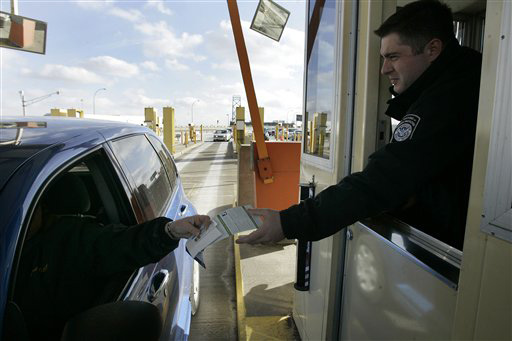Tougher identification rules requiring proof of citizenship to take effect at U.S. border

U.S. Customs officer Nick Ligerakis hands back a Michigan drivers license and information pamphlet to a driver arriving from Canada at the Ambassador Bridge in Detroit, Wednesday, Jan. 30, 2008. U.S. officials begin what amounts to a test run of new ident Paul Sancya, The Associated Press
Jan 31, 2008
Last updated on May 12, 2016 at 08:47 p.m.
HIGHGATE, Vt. – Motorists easily passed through border checkpoints Thursday as enforcement of new rules for the types of identification U.S. and Canadian citizens must present to cross into the country began without the backups and confusion some travelers had feared.
Under the new rules, people will no longer be allowed to simply declare to immigration officers at border crossings that they are citizens, said Jayson Ahern, deputy commissioner with U.S. Customs and Border Protection.
Instead, those 19 and older will have to show proof of citizenship – a passport, trusted traveler card or a birth certificate and government-issued ID such as a driver’s license.
At the Highgate Springs port of entry at the top of Interstate 89 in Vermont, nearly all motorists were carrying the documentation they needed, said Port Director James McMillan. Waits to cross the border were no more than two to three minutes.
Get The Daily Illini in your inbox!
“Everything has been running really smoothly,” he said.
There were no additional delays during the morning rush hour in Detroit, which has the busiest northern border crossing, said Ron Smith, a spokesman for U.S. Customs and Border Protection in Detroit. The bridge and tunnel crossings between Detroit and Windsor, Ontario typically can see wait times of about 30 minutes to enter the U.S.
No unusual delays were reported at Texas crossings.
In North Dakota, officials at the Pembina port of entry reported only one vehicle out of 250 crossing from Canada as of midmorning did not have the proper documents. The travelers were given a paper explaining the new requirements, said Jason Schmelz, an assistant port director for the U.S. Customs and Border Protection Agency.
“If we have no questions, we just issue them that piece of paper and then they’re allowed to proceed into the U.S.,” he said.
Officers at the ports will have latitude to admit people who are unaware of the changes once their identities are confirmed, Ahern said. In Detroit, authorities will provide a grace period for travelers without the extra ID, and will hand out fliers explaining the changes, Smith said.
Congress approved the Western Hemisphere Travel Initiative in 2004, which requires verified citizenship and identification of all those entering the country from Canada, Mexico and the Caribbean. The passport requirement for land and sea crossings has been delayed until June 2009.
Smith said few people have crossed the northern border by just declaring their nationality since the 2001 terrorist attacks, because officers have always had the discretion to request documents.
Over the last two fiscal years, 31,000 people who claimed at the borders to be U.S. citizens were not, Ahern said.
Critics, particularly in northern border states, have assailed Department of Homeland Security Secretary Michael Chertoff over the changes. Sen. Norm Coleman, R-Minn., accused him of not understanding “the practical effects of DHS policies on the everyday lives of border community residents.”
But Ahern said new passport cards the size of credit cards will allow citizens to cross the U.S.-Mexican border effectively and efficiently. Applications should be available starting Friday, although processing will take three to four months. Cards without previously issued passports will cost $45 for adults and $35 for children; they will cost $20 and $10, respectively, for those with passports.
Drivers’ licenses enhanced with proof of citizenship and a radio frequency identification chip also will be accepted, Ahern added. Four states including Arizona have signed up for a federal program to offer the licenses. British Columbia also is experimenting with similar new high-tech licenses.
Ahern said he does not expect delays at entry ports over the new requirements – contradicting Chertoff’s comments earlier this month that longer lines will be inevitable at first.
Associated Press writers Jeff Karoub in Detroit, Tim Klass in Seattle, Alicia A. Caldwell in El Paso, Texas; Wilson Ring in Alburg, Vt.; and Elliott Spagat in San Diego contributed to this report.





